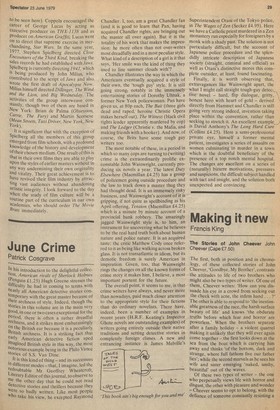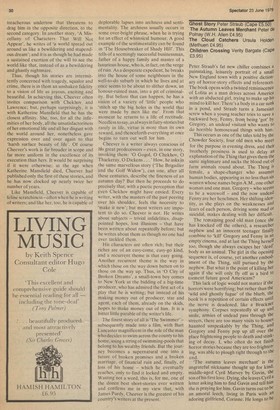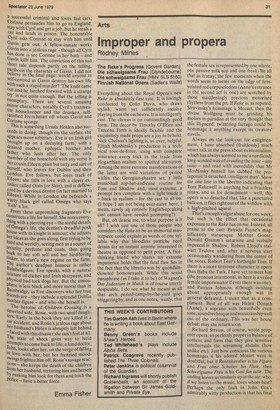Making it new
Francis King
The Stories of John Cheever John Cheever (Cape £7.50) The first, both in position and in chronology, of these collected stories of John Cheever, 'Goodbye, My Brother', contrasts the attitudes to life of two brothers who might also be two types of writer. Of one of them, Cheever writes: 'How can you dissuade his eye in a crowd from seeking out the cheek with acne, the infirm hand. . . ?' The other is able to respond to 'the inestimable greatness of the race, the harsh surface beauty of life' and knows 'the obdurate truths before which fear and horror are powerless.' When the brothers separate after a family holiday — a violent quarrel making it unlikely that they will ever again come together — the first looks down at the sea from the boat which is carrying him away and thinks 'of the bottom, dark and strange, where full fathom five our father lies'; while the second marvels as he sees his wife and sister emerging 'naked, unshy, beautiful' out of the waves.
Of these two types of writer — the one who perpetually views life with horror and disgust, the other with pleasure and wonder — Cheever seems to opt to belong, with the defiance of someone constantly resisting a treacherous undertow that threatens to drag him in the opposite direction, to the second category. In another story, 'A Miscellany of Characters That Will Not Appear', he writes of 'a world spread out around us like a bewildering and stupendous dream'; and it is as though he had made a sustained exertion of the will to see the world like that, instead of as a bewildering and ghastly nightmare.
Thus, though his stories are intermittently concerned with tragedy, squalor and crime, there is in them an unshaken fidelity to a vision of life as joyous, exciting and beautiful. In achieving this, Cheever often invites comparison with Chekhov and Lawrence; but, perhaps surprisingly, it is with Katherine Mansfield that he has the closest affinity. She, too, for all the infirmities of her body, all the unsatisfactoriness of her emotional life and all her disgust with the world around her, nonetheless gave expression over and over again to that 'harsh surface beauty of life'. Of course Cheever's work is far broader in scope and far more uniform in the excellence of its execution than hers. It would be surprising if it were otherwise: at the age when Katherine Mansfield died, Cheever had published only the first of these stories,and he has now clocked up nearly twice her number of years.
Like Mansfield, Cheever is capable of feline scratchiness –often when he is writing of writers; and like her, too, he is capable of deplorable lapses into archness and sentimentality. The archness usually occurs in some over-bright phrase, when he is trying for an effect of whimsical humour. A good example of the sentimentality can be found in 'The Housebreaker of Shady Hill'. This tells of a seemingly successful businessman, father of a happy family and master of a luxurious house, who is, in fact, on the verge of ruin. As a desperate expedient, he breaks into the house of some neighbours in the well-to-do suburb in which he lives and at once seems to be about to slither down, an honour-ruined man, into a pit of criminality. But before that can happen, he has a vision of a variety of 'little' people who 'stitch up the big holes in the world that were made by men like me'. From that moment he returns to a life of rectitude. Needless to say, as always in fairy-stories but rarely in life, virtue is more than its own reward, and thenceforth everything at once begins to turn out well for him.
Cheever is a writer always conscious of Ms great predecessors – even, in one story, invoking them: '0 Gogol, 0 Chekhov, 0 Thackeray, 0 Dickens. . . 'How, he asks in the same marvellous story (`The Brigadier and the Golf Widow'), can one, after all these centuries, describe the fineness of an autumn day? But then he proceeds to do precisely that, with a poetic perception that even Chekhov might have envied. Every writer, with the masters of the past peering over his shoulder, feels the necessity to 'make it new'; but most writers are impotent to do so. Cheever is not. He writes about subjects – trivial infidelities, disappointed hopes, lost illusions – that have been written about repeatedly before; but he writes about them as though no one had ever tackled them.
His characters are often rich; but their riches are of an easy-come, easy-go kind, and a recurrent theme is that easy going. Another recurrent theme is the way in which those on the way down batten on to those on the way up. Thus, in '0 City of Broken Dreams', a small-town boy comes to New York at the bidding of a big-time producer, who has admired the first act of a play that he is writing; but instead of his making money out of producer, star and agent, each of them, already on the skids, hopes to make money out of him. It is a bitter little parable of the writer's life.
The finest story of all is 'The Swimmer' – subsequently made into a film, with Burt Lancaster magnificent in the role of the man who decides to swim across the county to his home, using a string of swimming-pools that belong to his wealthy friends. But the journey becomes a supernatural one into a future of broken promises and a broken marriage, of financial ruin and, finally, of loss of his home – which he eventually reaches, only to find it locked and empty. Wasting not a word, this is, for me, one of the dozen best short-stories ever written and confirms me in my view that, with James Purdy, Cheever is the greatest of his country's writers at the present. Peter Straub's fat new chiller combines a painstaking, leisurely portrait of a small New England town with a positive dictionary of horror-story effects and references. The book opens with a twisted reminiscence of Lolita as a man drives across America with an abducted girl, trying to make up his mind to kill her. There's a body in a car sunk in a pond, and Straub turns a Jamesian screw when a young teacher tries to save a backward boy, Fenny, from being 'got' by Gregory, an undead visitant who wants to do horrible homosexual things with him. This occurs as one of the tales told by the Chowder Society, four old men who meet for the purpose in evening dress, and their brotherly prosiness is used to delay an explanation of the Thing that gives them the same nightmare and sucks the blood out of farm animals round about. The Thing is female, a shape-changer who assumes human bodies, appearing as no less than six women whose names begin A.M., one other woman and one man. Gregory – who seems to be a warewolf – and the now undead Fenny are her henchmen. Her shifting identity, as she plays on the weaknesses and fears of each person, driving some mad or suicidal, makes dealing with her difficult.
The remaining good old man (once she has knocked off the others), a researcher nephew and an innocent teenager finallY combine to 'kill' Gregory and Fenny in an empty cinema, and at last the Thing herself too, though she always escapes her 'dead body as an animal. The girl in the opening sequence is, of course, yet another embodiment of the Thing, still pursued by the nephew. But what is the point of killing her again if she will only fly off as a bird to torment future good Americans? This lack of logic would not matter if the horrors were horrifying; but rather than the 'wild and ghostly fugue' of the blurb, the book is a repetition of certain effects until the nerve is deadened, like a Bruckner symphony. Corpses repeatedly sit up and. smile, armies of undead pass through tile streets, there are too many visits to houses haunted unspeakably by the Thing, and Gregory and Fenny pop up all over the place frightening people to death and stinking of decay. I, who often do not finish horror stories because they are too frighten' ing, was able to plough right through to the end. 'The autumn leaves merchant' is the ungrateful nickname thought up for kind, middle-aged Cyril Marvey by Gavin, the son of his first love. Dying, she leaves Cyril a letter asking him to find Gavin and tell hint she is praying for him. Gavin turns out to he an amoral leech, living in Paris with all adoring girlfriend, Corinne. He longs to he a successful criminal and loves fast cars; Corinne persuades him to go to England, stay with Cyril and get a job, but he steals a car and lands in prison. The honourable Cyril asks Corinne to stay with him until Gavin gets out. A fellow-inmate works Gavin into a jealous rage — though all Cyril has done is see Corinne in her bath — and Gavin kills him. The conviction of this sad Short tale depends partly on the telling, partly on the character of Gavin. I did not believe in the final page: would anyone as self-centred as Gavin destroy his own life with such a stupid murder? 'The knife came out and he lurched forward with a strange Cry is not quite enough. But the telling is exemplary. There are several amusing minor characters, notably Cyril's transvestite housekeeper and the drunken, selfsatisfied Frenchman off whom Gavin' and Corinne sponge. This is something Ursula Holden also succeeds in doing, though on the surface she appears more arbitrary. Eve is an Irish girl brought up on a decaying farm, with a drained mother, epileptic brother and father who lusts after her. The only member of the household with any verve is her cousin Eileen, plain but tarty and sure of herself, who leaves for Dublin and then London. Eve follows, but loses track of Eileen; she falls in love with a clever tinker called called Oisin (or Skin), and is deflowered by a devious dentist (in fact married to Eileen). While in London she befriends a warty black girl called Omega who says 'Eeh' a lot.
From these unpromising fragments Eve constructs a life for herself. She notes everything with a piercing eye — the sordid details of Omega's life, the dentist's dreadful posh house with its knight in armour; she adjusts her ideas as she goes along, first trying to be hard and worldly, seeing men as a source of security, perfume and coats, then going back to her soft self and her bird-loving tinker, to starea new regime on the farm. The author's deadpan humour is rather Bainbridgean; Eve speaks with a natural mixture of cliches and Irish sharpness, and Physical bad luck dogs her. But the atmosPhere is less black and more moral than in Bainbridge, as Eve discovers who her true friends are — they include a splendid Dublin mother-figure — and who she herself is. The heroine of Children Crossing is a deserted wife, Rosie, with two small daughters. Early in the book they are killed in a car accident, and Rosie's jealous rage about her husband's Helen is abruptly left behind —faced with this disaster she can't feel at all. The state of shock gives way to lurid attempts to come back to life; a kind doctor, John, looks after her, on the verge of falling in love with her, but her frenzied mood swings frighten him off. Rosie's savage reactions — she keeps the death of the children from her husband, torturing him and herself by making him look for them and fetch the Police — have a bitter force.












































 Previous page
Previous page